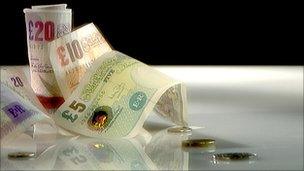Tax letters: Write-offs would be 'unaffordable'
- Published

Some people will see their tax bill affected by the review
The country "cannot afford" to write-off underpayments of income tax caused by calculation system problems, Treasury minister David Gauke has said.
The comments in the Commons came as experts suggested taxpayers had little chance of escaping payments.
Some 45,000 people are receiving letters from HM Revenue and Customs by second-class post explaining that they have paid the wrong amount of tax.
Nearly six million taxpayers will receive letters by Christmas.
In response to an urgent question raised in the Commons, Mr Gauke said that the repayments would be sorted out "as painlessly as possible", and the government was looking to reform the "outdated and inefficient" PAYE system.
He said that there was a total of ВЈ2bn owed, and that the country could not afford to write off all of this amount.
However, individuals who owed less than ВЈ300 in underpaid tax are not being pursued and will not receive letters. This is higher than the previous threshold of ВЈ50.
Repayments of between ВЈ300 and ВЈ2,000 may be spread by HMRC over three years in cases of "genuine hardship" Mr Gauke said, rather than just one year, which is the normal practice.
Challenge
Extra tax charges will average ВЈ1,380 and most of these will be recovered via changes to next year's tax codes.
A number of tax experts have suggested that those who have underpaid tax should challenge these underpayments.
A procedure called the extra statutory concession allows HMRC to write off tax, if it was provided with all the relevant information but failed to use it within 12 months of the end of the tax year in which the information was received.
However, Mr Gauke said that people should not "build up their hopes" that appeals would succeed.
"Of course the government is very keen that everybody who is in a position of having underpaid their tax is treated sympathetically," he said.
"Our experience is that, because this issue is not entirely new - it is the fact that there are underpayments every year with the PAYE system - our experience is that very few of those appeals succeed."
An HMRC spokesman has also said that the concession only applied to a "small number of cases".
And, writing for the ґуПуґ«ГЅ News website, former tax inspector Ronnie Ludwig said these challenges only worked when the HMRC had been provided with full information.
"While there may be a number of cases where the concession is applicable and HMRC may then agree to write off the arrears, for the majority that is unlikely to be the case," he said.
Computer system
The mistakes in the tax system have been revealed by the introduction of a new computer system.
The letters refer to the tax years 2008-09 and 2009-10, and it is possible that people have both overpaid and underpaid tax in the two years. These people could receive two letters in the same envelope from the HMRC. The payments could cancel each other out.
The tax authority also confirmed that it would not charge interest on underpayments under ВЈ2,000.
There have also been warnings about fraudsters seizing the opportunity to trick people out of cash, claiming they are from HMRC. The tax authority stressed it would never make telephone calls or send e-mails explaining overpayments or underpayments, instead this would be via letters.
This response to the official HMRC's first letters would be used to work out how to proceed with the other cases.
There are an estimated 4.3 million overpayments of tax, and 1.4 million underpayments, Mr Gauke said.